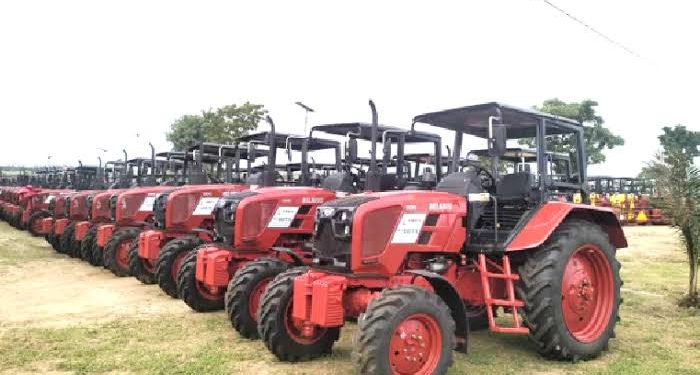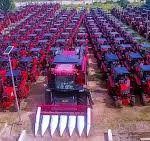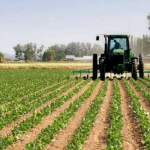Months after President Bola Ahmed Tinubu launched an ambitious mechanisation programme with N50 billion worth of agricultural equipment, thousands of tractors and implements remain unused at the National Agricultural Seed Council (NASC) headquarters, sparking frustration among farmers and experts who warn of lost planting opportunities and wasted resources.
The equipment, including 2,000 tractors, 2,000 disc ploughs and harrows, 1,000 disc ridgers, 1,200 trailers, 500 seed drills, 300 boom sprayers, 10 harvesters, and 12 mobile workshops was expected to transform farming efficiency under the Renewed Hope initiative. Yet, despite the public unveiling, no distribution has begun.
The machinery, imported from Belarus, reportedly includes over 9,000 units of agricultural equipment. While official costs remain undisclosed, industry estimates suggest an average tractor costs around ₦28 million. Even at a subsidised rate of ₦15 million, the 2,000 tractors alone could amount to nearly ₦30 billion.
At the inauguration, President Tinubu described the move as a “monumental leap” toward agricultural independence.
“We are taking a bold step with state-of-the-art agricultural equipment. I want to make agriculture more attractive to our youths,” he said.
He assured that the equipment would empower service providers, support year-round cultivation, and create jobs across the sector.
Despite those assurances, over three months later, the Federal Ministry of Agriculture and Food Security confirms that it is still awaiting directives from the Presidency on how the equipment should be allocated.
A senior ministry official, speaking anonymously, said distribution is stalled due to the pending “sharing formula.” Another official revealed growing internal frustration, noting that operational decisions now heavily rely on presidential approval.
This delay contrasts sharply with the initial plan announced by Minister Abubakar Kyari, who proposed three access models: direct sales, leasing schemes, and community-based service centres for smallholder farmers.
These models, he said, were designed to reduce manual labour costs and make modern machinery accessible.
For farmers, the uncertainty is more than administrative ,it’s seasonal. Members of the All Farmers Association of Nigeria (AFAN) say they have heard nothing since the launch.
“Farmers were happy during the launch, but we are still waiting and monitoring the sharing formula,” said Daniel Okafor, AFAN’s Vice President.
Agricultural experts warn that delays could render the equipment ineffective for the current planting cycle. Professor Simon Tuange, an agricultural engineer from Joseph Sarwuan Tarka University in Makurdi, stressed the urgency.
“Agriculture without mechanisation is like a vehicle without wheels. Operations are time-bound. If tractors are not used during land preparation, they may miss the entire season,” he warned.
He also explained that mechanisation goes beyond tractors, requiring full systems for planting, processing, storage, and transport.
While the government focuses on distribution, experts caution against a recurring problem, lack of maintenance. Professor Tuange criticised the importation of equipment without establishing repair and support systems.
“You cannot import tractors without after-sales plans. Maintenance workshops must be set up to prevent breakdowns and abandonment.”
For many rural farmers and agro-based SMEs, the stalled rollout reflects a broader issue: well-intentioned government interventions hindered by bureaucracy. Without timely deployment, high labour costs and limited mechanisation will persist, undermining national food security targets.










